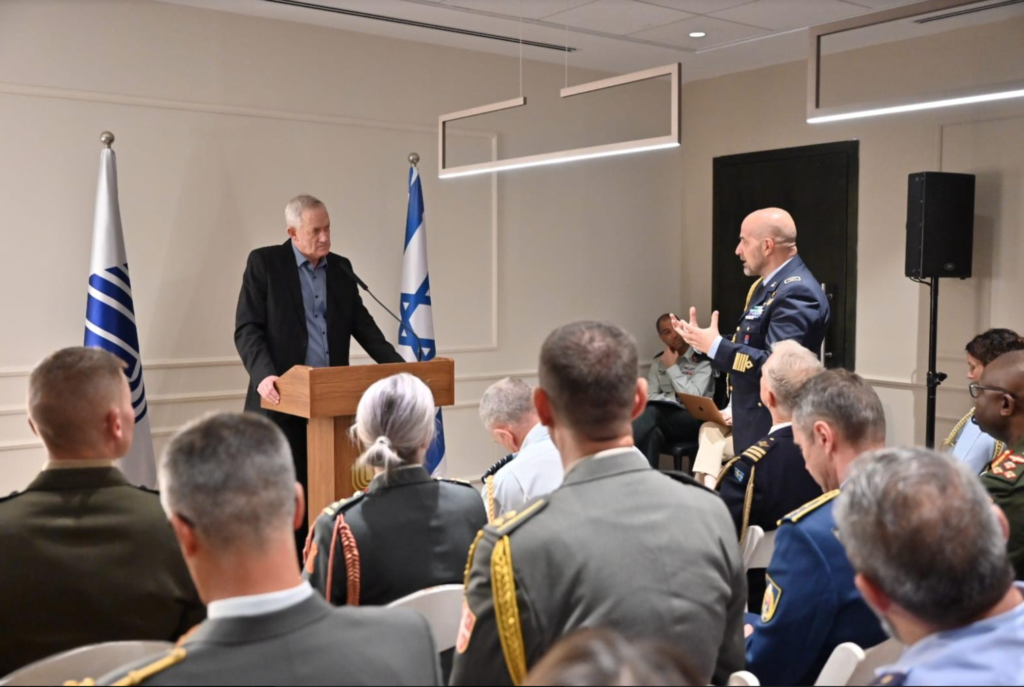
Iran could be capable of developing enough enriched uranium for a nuclear weapon in just two weeks, Israeli Defense Minister Benny Gantz warned on Sunday. While there is no public indication that Iran has made the move towards uranium enriched to weapons-grade fuel, considered 90% purity, Gantz said Tehran “may reach” enough for one bomb in a couple weeks “should Iran decide to do so.”
Gantz—in comments published by Israel—told defense attaches from more than 30 nations that “Iran continues to build, expand and fortify its capabilities… The international community must take action—strengthening alliances, increasing intelligence cooperation, projecting power and responding forcefully to Iranian attacks and aggression.”
The warnings from the outgoing Israeli Defense Minister come as Israel and the United States have recently made not-so-subtle threats that a military attack on Iran’s nuclear program remains on the table. Just last week, military jets from Israel and the United States, including refueling aircraft, conducted joint exercises in Israel. According to a series of posts on the IDF Twitter feed, this included “long-distance” simulations by the Israeli Air Force and IDF intelligence.
Said the IDF Twitter post, “These exercises are a key component of our two militaries’ increasing strategic cooperation in response to shared concerns in the Middle East, particularly those posed by Iran.”
Also last month, IDF Chief Lt. Gen. Aviv Kohavi made comments posted to the IDF Twitter page hinting at the “acceleration” of military plans against Iran. Speaking after he met with senior US officials in Washington, Kohavi said, “It was agreed that we are at a critical point in time that requires the acceleration of operational plans and cooperation against Iran and its terrorist proxies in the region.”
Not too long ago, Iran was a year or more away from being able to produce the fuel for a nuclear weapon, also referred to as their “breakout” time. However, Iran has been expanding the amount and quality of their nuclear fuel in recent years and taking steps beyond a normal civilian nuclear program. This has been done in an effort to force the United States to re-join the international nuclear deal that provided Iran with economic sanctions relief in exchange for self-imposed restrictions on their nuclear program. The US exited the deal in 2018 after concerns about the arrangement were not addressed.
The Europeans thought a proposed compromise earlier this year had the sides on the cusp of a renewed nuclear accord, but an unacceptable counteroffer from Iran stalled the negotiations. Now, the talks seem to have shifted from diplomacy to military posturing and threats.
Iran’s nuclear program may be the greatest danger posed by the Islamic Republic, but it’s far from the only one. On Sunday, Gantz also highlighted Iran’s attacks on civilian sea vessels. He reminded his audience that Iran attacked a commercial vessel in November with an unmanned aerial vehicle (UAV) sent from Iran’s Chabahar region.
“This is the same area I discussed 1 year ago with your Ambassadors, as a hotspot of terrorism,” said Gantz. “In fact, in the last 5 years, Iran has conducted at least 16 separate attacks on civilian international vessels in the Gulf and the Red Sea.”
Iran’s UAV threat has even extended beyond the Middle East, as Iran has reportedly provided Russia with military drones to in their war with Ukraine.
Thankfully, the global community and Israel are also working together to counter Iran and other threats, especially in the last two years. In addition to the Abraham Accords signed in 2020 and Israel’s later joining of the US Central Command coverage, Gantz said that “there have been over 200 interactions between Israeli officials and regional partners” and around 140 defense agreements and “groundbreaking” memorandums of understanding signed between Israel and partner nations.
As Gantz noted on Sunday, “Iran is a global and regional challenge and also a threat to the State of Israel.”
(By Joshua Spurlock, www.themideastupdate.com, December 4, 2022)
